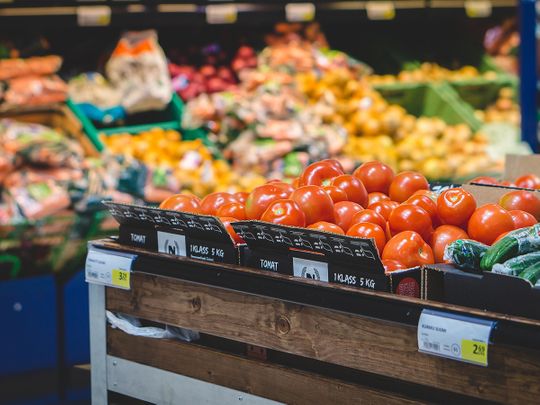
Dubai: When grocery shopping in the emirate, you can save money by planning ahead of time, by studying price trends observed over the past seven months.
When analysing the cost of poultry, seafood, fruits and vegetables, here are a few useful patterns that can assist a shopper in saving money in both the short run and even more so in the longer term.
Which months, weeks are best for grocery discounts?
While the prices do not differ starkly during most months of the year, as the government keeps a lid on costs and prevents any major price spikes from happening – when studying prices over the last seven months, the cost of food items stayed largely in check, the most particularly during the months of August and September. Although we are nearing the end of winter, no noticeable changes in prices were observed.
Which days are ideal for grocery discounts?
During the course of these months, it was observed to be cost effective to buy fresh chicken during the start of the week, especially most Mondays. On the other hand the cost of seafood and vegetables were seen to be largely cheaper halfway through the week, and cost-effective fruits could be ideally picked up towards the end of the week.
Pick up seafood every Wednesday!
If you were wondering about which part of the week would be ideal to pick up seafood at a lesser-than-usual cost, the answer is still mid-week. A study of prices over the last seven months proved that the cost of fish and shrimp dropped mostly on Wednesdays, while prices were seen higher during the start of the week.
The price of all seafood variants, be it Seabass, Hamour, Kingfish, Salmon, Sea Bream or small-sized shrimp, was seen dropping halfway through the week, over the past 24 weeks. So, that would be good news for those seafood-lovers who were looking for cost effective days to shop!
Moreover, when analysing prices of these fish species, it was also observed that the days prices largely stayed consistantly high was at the start of the week, particularly Monday and sometimes on Sunday - so it would be safe to avoid stocking up on seafood soon after the weekend, to take it easy on your pocket and your finances.
Brief ban on sale of two fish species
The UAE's Ministry of Climate Change and Environment said last week it will impose a trade ban on sharks from March 1. The ban will be on till June 30. A ministerial resolution allows fishermen to fish sharks only from July 1 until the last day of February.
The emirates has earlier announced a ban on the sale of Goldlined Seabream and King Soldier Bream fish variants across the emirates from February 1 to 28 - which ends today, while also ending a five-year ban on the sale of the once-popular Arabian Safi (Rabbitfish) and Sheri (Emperor).
Fruits get more cost-effective on weekends
If you were wondering which day of the week would be best to pick up fruits at a cheaper-than-usual rate, the study of prices over the last seven months also showed that the cost of all fruits got cheaper towards the end of the week, making the weekend an ideal time to go shopping for fruits!
A weekly trend was also observed wherein the price of bananas started getting cheaper around mid-week and the cheapest during the weekend, so did oranges. The per-kilogram cost of lemons stayed largely in check the past few months.
This would be considered good news for those who are looking for cost-effective days to shop for citric fruits! A similar pattern arose when analysing the cost of apples and lime, which fell slightly towards the end of the week and got comparatively pricier at the start of the week, particularly on Sunday and Monday.
For those fruits that fluctuated, namely bananas, oranges and apples, prices were seen higher at the start of the week on Sunday, and it got cheaper towards the end of the week. Again, proving that the weekend is a great time to shop for fruits!
Most veggies get cheap mid-week!
When it comes to vegetables, prices of items like tomatoes, potatoes, cucumbers and lettuce were mostly seen dropping mid-week in the last 24 weeks, or a little over seven months.
The cost of onions, another common household staple, which largely stayed the same all through the past months at around Dh2 per-kilogram, saw prices spiking momentarily before stabilising, which would be received as good news for people looking to plan their grocery costs ahead.
Cost of fresh chicken drops most Mondays
When analysing the cost of poultry, beef and lamb over the past 28 weeks, it was observed to be cost-effective to buy fresh chicken largely during the start of the week, whereas the cost of other poultry items like frozen chicken and eggs stayed the same in the past seven months.
The price of fresh chicken was seen to continue to dip at the start of the week, mostly every Monday - making it an ideal time to buy and stock up on it. However, there were a few instances wherein prices dropped just ahead of the weekend as well.
So, be on a lookout when you go shopping this weekend, keeping in mind that a kilogram of the meat is currently at a fairly pricier price level of Dh12.9.
On the other hand, the price of beef and lamb, be it variants from Australia, India, Pakistan or the UAE, have stayed the same, as has been the trend, and did not witness any fluctuation in prices, over the course of the past seven months.
Current per-kilogram prices of every fish variant available in the market:
As of February 25, among fish variants, Seabass costs Dh34.9 per kilogram and Hamour was priced at Dh39. On the other hand, Kingfish was priced at Dh26.9, and Salmon was priced at Dh36.9. A kilo of SeaBream costs Dh33, while small-sized shrimp was currently cheaply priced at Dh29.
Current per-kilogram prices of every variant of beef and lamb available in the market:
The price of beef and lamb, be it variants from Australia, India, Pakistan was priced as follows, as of Thursday.
Among different varieties of beef, the variant from Australia cost Dh33 per kilogram, the type from India was priced at Dh28.3 and the kind that was locally produced was Dh42.6. On the other hand, when it came to lamb meat, the Australian variant now costs Dh41.5, the type from India was priced at Dh30, the Pakistan-produced kind cost Dh37.7, while a kilogram of the regional variety was Dh45.2.
Current per-kilogram prices of every variant of fruits and vegetables available in the market:
When it comes to fruits the per-kilo starting price of bananas are currently priced at Dh3.5, oranges are Dh2.5 and apples cost Dh3. On the other hand, prices pertaining to vegetables include - regional tomatoes costing Dh2.3, red onions at Dh2, potatoes at Dh1.5 and lettuce at Dh4. Also, the price of a kilogram of lemon is Dh4.3, while lime costs Dh4.








